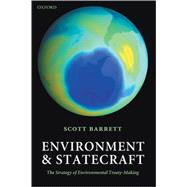Environment and Statecraft The Strategy of Environmental Treaty-Making
, by Barrett, Scott- ISBN: 9780199286096 | 0199286094
- Cover: Paperback
- Copyright: 1/5/2006
Environmental problems like global climate change and stratospheric ozone depletion can only be remedied if states cooperate with one another. But sovereign states usually care only about their own interests. So states must somehow restructure the incentives to make cooperation pay. This iswhat treaties are meant to do. A few treaties, such as the Montreal Protocol on Substances that Deplete the Ozone Layer, succeed. Most, however, fail to alter the state behaviour appreciably. This book develops a theory that explains both the successes and the failures. In particular, the book explains when treaties are needed,why some work better than others, and how treaty design can be improved. The best treaties strategically manipulate the incentives states have to exploit the environment, and the theory developed in this book shows how treaties can do this. The theory integrates a number of disciplines, including economics, political science, international law, negotiation analysis, and game theory. It also offers a coherent and consistent approach. The essential assumption is that treaties be self-enforcing-that is, individually rational, collectivelyrational, and fair. The book applies the theory to a number of environmental problems. It provides information on more than three hundred treaties, and analyses a number of case studies in detail. These include depletion of the ozone layer, whaling, pollution of the Rhine, acid rain, over-fishing, pollution of theoceans, and global climate change. The essential lesson of the book is that treaties should not just tell countries what to do. Treaties must make it in the interests of countries to behave differently. That is, they must restructure the underlying game. Most importantly, they must create incentives for states to participate in atreaty and for parties to comply.







